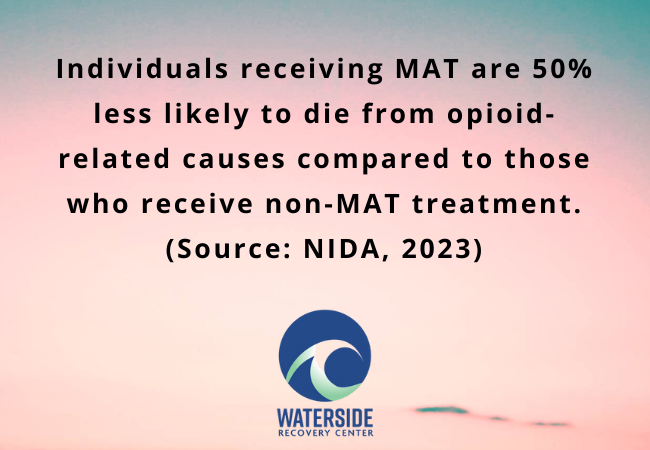Opiate addiction is a powerful, chronic illness—one that affects not just the body, but also the brain, emotions, relationships, and daily life. For many individuals seeking long-term recovery, Medication-Assisted Treatment (MAT) offers a lifeline. It’s not just a medication—it’s a strategy backed by decades of research, trusted by top medical institutions, and integrated into modern treatment plans across the country.
At Waterside Recovery, a leading Massachusetts addiction treatment center, we offer MAT as part of our opiate addiction treatment programs, including within our Partial Hospitalization Program (PHP) and Outpatient Treatment Program (OP). In this guide, we’ll explore how MAT works, who it’s for, and how we use it to help people find lasting recovery.
What Is Medication-Assisted Treatment (MAT)?
Medication-Assisted Treatment (MAT) is an evidence-based, integrated treatment approach that combines FDA-approved medications with counseling and behavioral therapy to treat opioid use disorder (OUD). It is designed to:
- Alleviate painful withdrawal symptoms
- Reduce intense drug cravings
- Block the euphoric effects of opioids
- Stabilize brain chemistry disrupted by substance use
Unlike outdated misconceptions, MAT is not trading one addiction for another. It is a highly effective medical approach that helps people regain control over their lives, often making the difference between relapse and recovery.
Why MAT Matters: A Science-Based Solution to a Life-Threatening Crisis
- Opioid-related overdose deaths have surpassed 75,000 annually in the U.S.
- Individuals who undergo MAT are 50% less likely to die from overdose than those who do not.
- MAT improves treatment retention, reduces illicit drug use, and lowers rates of HIV and hepatitis C transmission. (Source: SAMHSA, NIDA)
For many clients, especially those who have relapsed multiple times, MAT is not optional—it’s essential.
Who Benefits from MAT?
MAT is suitable for individuals who:
- Are dependent on heroin, fentanyl, oxycodone, morphine, hydrocodone, or other opioids
- Experience severe withdrawal symptoms or post-acute withdrawal syndrome (PAWS)
- Have tried abstinence-based programs and relapsed
- Need medical stabilization to safely participate in therapy and daily life
- Are entering or stepping down from a Partial Hospitalization Program or Outpatient Treatment Program
How Medication-Assisted Treatment Works
1. Medications Used in MAT for Opiate Addiction
Buprenorphine (Suboxone® / Subutex®)
- A partial opioid agonist, buprenorphine attaches to opioid receptors but does not fully activate them.
- It reduces cravings and withdrawal without producing a euphoric high.
- Often prescribed as Suboxone (buprenorphine + naloxone) to discourage misuse.
- Can be used in both PHP and outpatient settings, allowing clients to function in daily life while stabilizing.
Methadone
- A full opioid agonist, methadone is long-acting and helps prevent withdrawal and cravings.
- Administered in a regulated clinical setting, often as a daily oral dose.
- Best suited for individuals with long-standing or high-severity opioid use disorder.
- Not commonly used in outpatient settings unless through specialized clinics.
Naltrexone (Vivitrol®)
- An opioid antagonist, naltrexone blocks opioid receptors in the brain.
- Prevents opioids from having any effect, making relapse less rewarding.
- Delivered as a monthly injectable (Vivitrol) or daily pill.
- Used after detox once opioids are fully cleared from the system.
2. Therapy and Counseling: The Other Half of MAT
Medication alone does not address the psychological root causes of addiction. That’s why MAT must be paired with comprehensive therapy, including:
- Cognitive-Behavioral Therapy (CBT) – Identifying negative thought patterns and building new coping skills
- Dialectical Behavior Therapy (DBT) – Regulating intense emotions and improving relationships
- Trauma-Informed Therapy – Processing trauma that may underlie substance use
- Relapse Prevention Education – Understanding triggers and building long-term strategies
- Group and Family Therapy – Rebuilding trust, connection, and support systems
At Waterside Recovery, we integrate therapy directly into our Partial Hospitalization and Outpatient Programs, ensuring clients benefit from both medication and meaningful therapeutic progress.
MAT Within Our PHP and Outpatient Programs
MAT in Our Partial Hospitalization Program Massachusetts
Our PHP offers structured daily care without overnight stay, making it ideal for individuals needing:
- Intensive therapeutic services combined with medication support
- Supervised medication administration and monitoring
- Transition from detox or inpatient treatment
- Support managing cravings while participating in full-spectrum therapy
Our PHP in Massachusetts includes:
- Daily therapy sessions
- Case management
- Nutritional counseling
- Medication management and medical supervision
- Holistic activities like mindfulness and fitness
MAT in Our Outpatient Treatment Program Massachusetts
Once clients stabilize in PHP, they may transition to OP for more flexibility. MAT continues as part of:
- Weekly or biweekly therapy appointments
- Ongoing Suboxone or Vivitrol treatment
- Support for employment, education, and reintegration
- Access to peer support groups, alumni programming, and aftercare
Outpatient MAT helps clients sustain recovery while resuming life responsibilities.
Addressing Common Myths About MAT
1. “You’re just replacing one drug with another.”
→ MAT uses controlled, non-euphoric doses to stabilize the brain. It’s medically guided, not recreational.
2. “MAT isn’t real recovery.”
→ MAT patients are less likely to relapse, more likely to stay in therapy, and achieve full life functioning.
3. “I’ll have to stay on it forever.”
→ MAT is flexible and personalized. Some individuals stay on it long-term; others taper off when ready.
What to Expect During the First 30 Days of MAT
The first month of MAT can be both transformative and challenging, especially for individuals new to treatment. This section helps set realistic expectations for those beginning the journey.
Week-by-Week Overview:
-
Week 1 – Stabilization:
Initial medical evaluation, beginning medication (e.g., Suboxone or Vivitrol), and managing withdrawal symptoms. Clients often report relief from cravings within the first few days. -
Week 2 – Adjustment:
Therapies begin or intensify. Your body is adjusting to the medication, and you may begin processing early emotional or psychological challenges in therapy. -
Week 3 – Structure and Support:
Individuals begin to feel more physically and emotionally stable. Participation in group therapy and relapse prevention planning increases. Medication doses may be adjusted. -
Week 4 – Planning and Integration:
Clients work with case managers and therapists to build recovery goals, begin employment planning, or prepare for transition from PHP to outpatient care.
This section shows how MAT isn’t just about medication—it’s about building a solid foundation for long-term sobriety.

MAT and Whole-Person Healing – Why Holistic Support Matters
While MAT addresses the biological aspects of addiction, recovery also requires healing the mind, emotions, and spirit. This section reinforces how Waterside Recovery supports holistic recovery alongside MAT.
How We Integrate Whole-Person Healing with MAT:
-
Nutrition Therapy: Opioid use often depletes essential nutrients. We help clients rebuild health through balanced, restorative meals and supplements.
-
Mindfulness and Meditation: MAT may calm the body, but mindfulness helps quiet the mind, reduce anxiety, and improve self-awareness.
-
Physical Movement: Regular movement (walking, yoga, strength-building) supports endorphin production and strengthens overall wellness.
-
Creative Therapies: Art, journaling, and music therapy offer emotional outlets that are essential in early recovery when verbal expression may be difficult.
-
Spiritual Development: Whether through faith, service, or personal values exploration, MAT clients are encouraged to reconnect with meaning and purpose.
Why Choose Waterside Recovery for MAT in Massachusetts?
Expertise in Opiate Addiction Treatment
We understand the complexity of opioid dependence and provide specialized care from detox through long-term maintenance.
Continuum of Care
We offer:
- Medically supervised detox
- Partial Hospitalization Program (PHP)
- Outpatient Treatment Program (OP)
- Long-term relapse prevention and alumni services
Holistic and Whole-Person Focus
Our approach blends medical care with:
- Nutritional support and wellness
- Mind-body therapies like yoga and meditation
- Life skills coaching, employment support, and more
Conclusion
Medication-Assisted Treatment is not a shortcut—it’s a bridge to lasting recovery. It helps you think clearly, feel better, and participate fully in therapy and life. Whether you’re battling a years-long opioid addiction or struggling with a recent relapse, MAT may be the foundation you need to build a life of freedom and purpose.
At Waterside Recovery, we provide compassionate, comprehensive, and customized opiate addiction treatment in Massachusetts. With MAT, therapy, and holistic care, you can take control of your recovery—starting today. Call 866.671.8620 to speak with our team and learn how MAT can support your journey toward lasting freedom from addiction.
FAQ About MAT for Opiate Addiction
What is Medication-Assisted Treatment (MAT)?
MAT is a treatment approach that combines FDA-approved medications (like Suboxone, Methadone, or Vivitrol) with counseling and therapy to treat opioid use disorder. It addresses both the physical cravings and the psychological patterns of addiction.
What medications are used in MAT?
Common medications include:
-
Buprenorphine (Suboxone) – Reduces cravings and withdrawal
-
Methadone – Long-acting opioid used to prevent withdrawal
-
Naltrexone (Vivitrol) – Blocks opioid effects to prevent relapse
Is MAT just replacing one drug with another?
No. MAT medications are administered in controlled doses under medical supervision. They do not create a high when taken as prescribed, but rather stabilize brain chemistry and reduce the risk of relapse.
Do I have to be on MAT forever?
Not necessarily. The length of time on MAT varies by individual. Some stay on MAT long-term, while others taper off gradually with medical support. There is no one-size-fits-all timeline.
Is MAT available in outpatient care?
Yes. At Waterside Recovery, MAT is offered in both our Partial Hospitalization Program (PHP) and Outpatient Treatment Program (OP). This allows individuals to receive treatment while returning to work, school, or family responsibilities.


